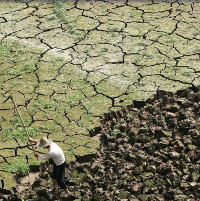Linking climate change, extreme events, and risk
In March the IPCC released a landmark report that assesses not only the link between climate change and an increase in extreme events associated with droughts and heavy precipitation, but the risks to broad populations from such events and the options individuals, communities and countries have to both prepare for and recover from natural disasters. The report, entitled “Managing the Risks of Extreme Events and Disasters to Advance Climate Change Adaptation,” or “SREX.”
The purpose of SREX is not simply to catalogue the impacts of climate change on extreme events, but to understand climate extremes in combination with socioeconomic vulnerabilities and exposure to risk in order to develop better policies to avoid, prepare for, respond to and recover from natural disasters. IIASA economist Reinhard Mechler, one of the lead authors, is focusing on the economic costs resulting from climate change, and he notes that while the changing climate has already led to an increase in the severity and frequency of some climate extremes, translating those increases into economic losses is not straightforward.
“We know from the report that climate change has led to an increase in extreme events and will continue to do so,” Dr. Mechler says. “However, contrary to what we would expect, we do not yet see that climate change has led to an increase in losses.
There are important caveats to be kept in mind, including deficiencies in the global databases reporting the loss data. The databases report impacts in regions with high insurance coverage (often estimates of total loss are scaled up from insured losses) and thus tend to underreport losses in developing countries, where there is less insurance. Moreover, the databases underreport losses resulting from droughts, which is the key hazard for many regions. Drought losses are particularly difficult to assess as they are not clustered in time and space like other events, such as floods.
Over the period 2000–2008, Africa had 15% of all disaster events around the globe, while only 0.6% of global losses were reported for this region. Understanding why there is not a concurrent increase in monetary losses is also linked to the way communities have responded to the increasing risk.
“The studies have not looked extensively at vulnerabilities or risk reduction,” Dr. Mechler says. The vulnerability is offset in some places by better construction and preparation, but it is a complex equation that must balance risk, vulnerability, and exposure. Regions of Florida in the USA have a history of being struck by hurricanes, so buildings are constructed with hurricanes in mind, reducing their vulnerability and risks. But parts of Florida that were almost devoid of people 100 years ago are now crowded, so exposure has dramatically increased the potential and actual losses.”
Singling out the contribution of climate change to losses from extremes by correcting for changes in hazard, exposure, and vulnerability is a tricky task,” Dr. Mechler says. “The SREX report came to the conclusion that today we cannot show how climate change increases monetary losses, but there is all the evidence to expect that in the future it will be there.
As another key contribution to the report, Dr. Mechler and colleagues suggest a “low regrets” approach may be particularly conducive for dealing with extreme events in climate adaptation. This approach is somewhat different from the more traditional ”no-regrets” or “win–win” solutions that suggest an optimal course of action.
The “low-regrets” approach is attractive because it takes into account the large uncertainties associated with extreme events and climate change and holds that efforts can start today. Low-regrets measures would “provide benefits under current climate and a range of future climate change scenarios and are available starting points for addressing projected trends in exposure, vulnerability, and climate extremes,” Dr. Mechler says.
The “low regrets” approach also encourages climate scientists to think more about short-term actions to lessen the risk from extreme events, as well as the uncertainty surrounding projections of impacts. Climate scientists tend to work with long time horizons, Dr. Mechler says.
“We are suggesting that scientists look into the short term as extreme events and climate variability need further emphasis. We need to adapt today.”



